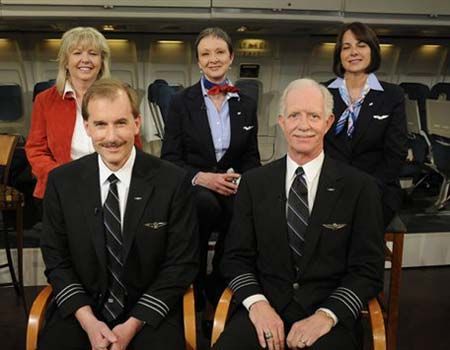Ground Control to Capt. Chesley B. “Sully” Sullenberger, III: “Which runway would you like at Teterboro?”
Capt. Sullenberger to Ground Control: “Unable; we’re going to be in the Hudson.”
Those were the laconic, spare words of the iconic “Sully,” as he calmly prepared to crash land Cactus 1549 in the Hudson River. The Airbus, carrying 155 passengers, had lost the thrust in both engines following a “double bird strike.”
The ins-and-outs of what transpired on January 15 were slow to surface. But surface they did when the former ace F-4 fighter pilot finally surrendered to the media. In an interview with CBS correspondent Katie Couric, Sullenberger likened the strike on his aircraft to “being pelted by heavy rain or hail. It sounded like the worst thunderstorm I’d ever heard growing up in Texas.” Ninety seconds into the flight, the engines fell silent and the cabin filled with the smell of “burned bird.”
With no engine power, flying at a low speed, at low altitude, “over one of the most densely populated areas on the planet,” Captain Sullenberger managed to glide the jet, using its “forward momentum to provide the air flow over the wings,” so as to enable “sufficient lift.” The river was the only “viable” surface on which to land with a chance of survival. That, Sullenberger had determined after “two and a half minutes into the flight—and just one minute after the birds had hit.”
It took a congenitally incurious Larry King 60 minutes to determine that he was not going to extract emotion from the steely Sully. Couric attempted a similar mission impossible. (“Too busy concentrating,” came the Captain’s curt reply.) Media sensationalism and sentimentality quickly morphed masterful professionalism into a miracle.
But the “Miracle on the Hudson” was less about the supernatural than about a superman—a man made from the right stuff.
“I needed to touch down with the wings exactly level. I needed to touch down with the nose slightly up. I needed to touch down at a descent rate that was survivable. And I needed to touch down just above our minimum flying speed but not below it. And I needed to make all these things happen simultaneously,” Sully explained reluctantly.
Silent, short-on-words and ego, big on humility, ability, and reliability: This is the traditional meaning of manly; this is the kind of guy who’s the best at what he does and almost always comes through for you. Men like “sully” are usually older. “Old Timers,” they’d be condescendingly called, nowadays. They generally have deeper voices, a slight swagger no amount of politically correct bullying can tame, and they do their jobs to perfection—and in the face of the persistent prattle over equal pay for unequal skill and effort. Older dads tend to be more Sully-like than their softer sons, who speak in fretful falsettos and sport pudgy, pizza faces.
This New Breed of Man can be observed in his natural habitat, at the supermarket. There, he will scrutinize products for trans fats, while the Sully sorts gravitate toward the hardware section of the store. Or make a break for Home Depot, when the wife is not looking. The modern, non-Sully specimen will often have a few spoilt, cranky kids in tow, and a papoose strapped to a sunken chest. He’ll be laboring to make the outing to the store a “learning experience” for the brats—one that every other patron is forced to endure.
This generic guy oozes oodles of psychological correctness and zero manliness. He never takes charge; he consults and cooperates. He’s not necessarily effeminate. Rather, he’s safely androgynous, and most certainly not guy-like in the Sully sense. As personalities go, he and the wife are indistinguishable.
Ladies (“mature” ones, at least): whom would you rather date, the Washington Post’s Chris Cillizza, of the trendy eye-wear and fussy affectation, or the macho, plain-spoken Tom Brokaw?
Couric went back to coaxing doubt and vulnerability from Sullenberger. To no avail:
“But there was still a big if,” she waxed. “I was sure I could do it,” said Sullenberger succinctly.
Missed by the perennial purveyors of pop culture and political correctness was a story about the value of an endangered, and vital, virtue: manliness. Witnessed in that cockpit was old-fashioned manliness. The feminization and regulation of American society over the last 20 to 30 years has meant that life-saving manliness is increasingly confined to corners where women are less likely to encroach: like the cockpit.
During those first crucial minutes into the fated flight, and in accordance with the protocol, Capt. Sullenberger asserted control over the faltering plane: He placed his hand on the side stick and said, “My aircraft.” First officer Jeff Skiles shot back, “Your aircraft.”
Damn straight, Sully!
©By ILANA MERCER
WorldNetDaily.com
February 13, 2009
CATEGORIES: Feminism, Gender Issues, Individualism Vs. Collectivism, Media, Popular Culture

 print
print